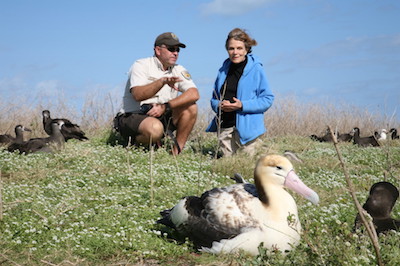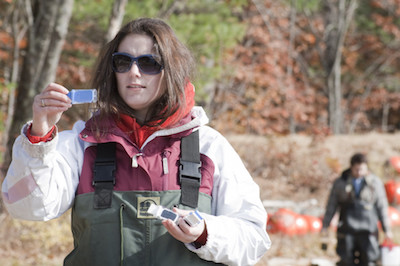
via Flickr User USFWS Pacific
At its most basic, biology is the study of life. Exploring the function, development, and growth of living systems from the human body to global climate, the chief aim of biology is to understand processes of evolution and the genes and cells that act as building blocks in our physical world. A highly multi-faceted and subdivided discipline, with specializations ranging from molecular and cellular biology to botany and physiology, choosing the study biology as an undergraduate can offer many different potential career paths and areas of focus. However, there are also agreed-upon foundations to biology as a university discipline, and your years in an undergraduate biology program will likely require you to study biology at the molecular level up to entire ecological systems, cultivating a well-rounded understanding of the physical world. As a result, biology majors can choose from a long and variable list of potential career options. Check out some below:
According to the National Center for Education Statistics, biology is a relatively popular major, with around 90,000 bachelor’s degrees in biology granted in the 2010-11 academic year out of the 1.72 million total, about 5.25%.
Due to the fact that there are so many potential options for specialization, many of those who study biology as undergraduates go on to do some form of postgraduate study in order to focus on one division of biology and, therefore, chisel out a clear-cut career path to follow after graduating from a Master’s or PhD program. For those who enter directly into the job field, median salaries are around $51,000, slightly lower than the mean across all majors.
Unless you’re hell-bent on entering into a field directly related to biology, it’s possible that you might not be solving Punnett Squares and talking Physiological Evolution on a day to day basis. However, a biology degree is well-rounded and cultivates a number of different skills and traits that can be applied to environments outside the laboratory and classroom. In fact, a fair amount of biology grads end up industries such as education, sales, and marketing.
Not unlike the other natural sciences, the majority of the work performed in an undergraduate biology program falls under the heading of experimentation. Biology students learn to run experiments from the ground up, observing phenomena, testing hypotheses, drawing conclusions, and synthesizing the findings into lab reports, scientific papers, and presentations. Part and parcel of this process is the ability to think critically and perform analyses. In essence, experimental results have little meaning until they are interpreted and related back to the initial hypothesis. Processes of performing analyses of biological data will likely invoke the need to understand statistical data and utilize computers.
As the fields of science and computer continue to overlap, it’s likely that you’ve spent a good deal of time utilizing computing power to run your experiments and analyze the results. From basic word processing and data inputting to more directly-related software, computer knowledge and familiarity is increasingly an absolute necessity to land jobs in a biology-related field, but can also help your chances if you are keen on striking off in a different direction after graduation.
Biologist Technician
Median Pay: $37,000
Working as a biology technician will allow a recent graduate to apply nearly all of the skills they have cultivated during their undergraduate studies. With the chief responsibility of conducting experiments and tests and analyzing the data, biology technicians work alongside a team of other technicians who report back to a biologist. The work of a biologist technician may take place within a university, R&D sector of an institution, the pharmaceutical industry, or healthcare providers. Working in a full-fledged lab will require a recent grad to apply their knowledge of testing procedures, pay careful attention to detail, and work efficiently as a member of a team. While you’ll be reporting to a higher-up biologist, technician positions are often stable and can offer sufficient room for advancement.

via Flickr User UNH Manchester
Conservation Scientist
Median Pay: $62,000
I won’t be the first one to tell you that, as a species, we’re using our natural resources faster than they can be replenished. With our prosperous times on this Earth theoretically ticking, it’s important that we invest in discovering ways to use our resources more efficiently. As such, conservation scientists are a pivotal role in our future, and a position that is well-suited for a recently graduated biology major. Often working with government agencies, conservation scientists often spend time in the field collecting samples and often work in remote locations such as national parks, where you may be employed performing analysis in the wake of natural disasters before bringing your findings back to a lab. If you’ve enjoyed your time performing experiments as a biology student but have itched to apply your skills outside – perhaps far outside – the classroom, a job as a conservation scientists might be the perfect fit.
Nutritionist
Median Pay: $45,000
With heart disease one of the top killers in the modern day and obesity an ever-prevalent issue, jobs in nutrition may be a great choice for biology graduates. Applying the learned scientific knowledge of the human body and its environment, nutritionists help to educate people about the food they eat and how it impacts not only their own bodies, but their communities and ecosystems as well. Nutritionists can be self-employed, but certain positions require certifications and postgraduate study.
Like your cohort over in the chemistry department, the most important thing a biology major can do is gain exposure in the lab. Showing a potential employer that you’ve worked in, and are familiar with lab equipment (which will be your chief tool, in all likelihood) can greatly increase your chances of landing a job. Internships in labs can span private, government, and non-profit sectors.
| Nuclear Medicine Technologist OhioHealth Columbus, OH | View |
| Assistant Microbiologist - 2nd shift Abbott Laboratories Columbus, OH | View |
| Biomedical Equipment Technician Medasource Westerville, OH | View |
| Medical Physicist Assistant - $15,000 Sign On Bonus Ohio State University Wexner Medical Center Columbus, OH | View |
| Medical Technologist - Microbiology Mount Carmel Health System Columbus, OH | View |
| Laboratory Technician ASK Chemicals Dublin, OH | View |
| Assistant Microbiologist - 2nd shift Abbott Laboratories Columbus, OH | View |
| Postdoctoral Fellow - Medical Imaging/Vascular Biology Nationwide Children's Hospital Columbus, OH | View |
| Microbiology Lab Manager- Columbus Plant Abbott Columbus, OH | View |
| Biomedical Engineering Tech II OhioHealth Dublin, OH | View |